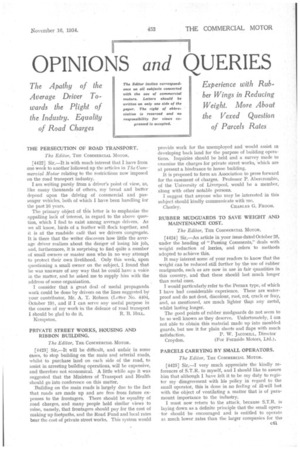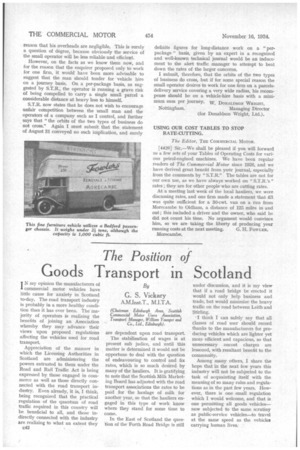OPINIONS and QUERIES
Page 107

Page 108

If you've noticed an error in this article please click here to report it so we can fix it.
The Apathy of the Average Driver Towards the Plight of the Industry. Equality of Road Charges Experience with Rubber Wings in Reducing Weight. More About the Vexed Question of Parcels Rates
THE PERSECUTION OF ROAD TRANSPORT.
The Editor, THE COMMERCIAL MOTOR.
[4422] Sir,—It is with much interest that I have from one week to another followed up the articles in The Uonimercial Motor relating to the restrictiens now imposed on the road transport industry.
I am writing purely from a driver's point of view, as, like many thousands of others, my bread and butter depend upon the driving of commercial and passenger vehicles, both of which I have been handling for the past 10 years. The primary object of this letter is to emphasize the appalling lack of interest, in regard to the above question, which I find to exist among average drivers. As we all know, birds of a feather will flock together, and it is at the roadside café that we drivers congregate. It is there that the writer discovers how little the average driver realizes about the danger of losing his job, and, furthermore, it is surprising to find quite a number of small owners or master men who in no way attempt to protect their own livelihood. Only this week, upon questioning a small owner on the subject, I found that he was unaware of any way that he could have a voice in the matter, and he asked me to supply him with the address of some organization.
I consider that a great deal of useful propaganda work could be done by drivers on the lines suggested by your contributor, Mr. A. T. Robson (Letter No. 4404, October 19), and if I can serve any useful purpose in the course of my work in the defence of road transport
I should be glad to do it. R. B. HILL. Kempston.
PRIVATE STREET WORKS, HOUSING AND RIBBON BUILDING.
The Editor, THE COMMERCIAL MOTOR.
[4423] Sir,—It will be difficult, and unfair in some cases, to stop building on the main and arterial roads, whilst to purchase land on each side of the road, to assist in arresting building operations, will be expensive, and therefore not economical. A little while ago it was suggested that the Ministers of Transport and Health should go into conference on this matter.
Building on the main roads is largely due to the fact that roads are made up and are free from future expenses to the frontagers. There should be equality of road charges, and many people hold similar views to mine, namely, that frontagers should pay for the cost of making up footpaths, and the Road Fund and local rates bear the cost of private street works. This system would provide work for the unemployed and would assist in developing back land for the purpose of building operations. Inquiries should be held and a survey made to examine the charges for private street works, which are at present a hindrance to house building.
It is proposed to form an Association to press forward for the easement of charges. Professor P. Abercrombie, of the University of Liverpool, would be a member, along with other notable persons.
I suggest that anyone who may be interested in this subject should kindly communicate with me.
Chorley. CHARLES G. FROOM.
RUBBER MUDGUARDS TO SAVE WEIGHT AND MAINTENANCE COST.
The Editor, Tim CommERcrAr. MOTOR. • [4424] Sir,—An article in your issue dated October 26, under the heading of "Passing Comments," deals with weight reduction of lorries, and refers to methods adopted to achieve this.
It may interest some of your readers to know that the weight can be reduced still further by the use of rubber mudguards, such as are now in use in fair quantities in this country, and that these should last much longer than metal ones.
I would particularly refer to the Pernax type, of which I have had considerable experience. These are waterproof and do not dent, discolour, rust-, rot, crack or fray, and, as mentioned, are much lighter than any metal, whilst lasting longer.
The good points of rubber mudguards do not seem to be so well known as they deserve. Unfortunately, I am not able to obtain this material made up into moulded guards, but use it for plain sheets and flaps with much
satisfaction. P. W. JAIsonirei., Director Croydon. (For Fernside Motors, Ltd.).
PARCELS CARRYING BY SMALL OPERATORS.
The Editor, THE COMMERCIAL MOTOR.
[4425] very much appreciate the kindly re
ferences of S.T.R. to myself, and I should like to assure him that although I have felt it to be my duty to register my disagreement with his policy in regard to the small operator, this is done in no feeling of but with the object of ventilating a matter that is of paramount importance to the industry.
I must now return to the attack, because S.T.R. is laying down as a definite principle that the small operator should be encouraged and is entitled to operate at much lower rates than the larger companies for the reason that his overheads are negligible. This is surely a question of degree, because obviously the service of the small operator will be less reliable and efficient.
However, on the facts as we know them now, and for the reason that the enquirer proposed only to work for one firm, it would have been more advisable to suggest that the man should tender for vehicle hire on a journey basis. On a per-package basis, as suggested by S.T.R., the operator is running a grave risk of being compelled to carry a single small parcel a considerable distance at heavy loss to himself.
S.T.R. now states that he does not wish to encourage unfair competition between the small man and the operators of a company such as I control, and further says that "the orbits of the two types of business do not cross." Again I must submit that the statement of August 31 conveyed no such implication, and surely definite figures for long-distance work on a " perpackage " basis, given by an expert in a recognized and well-known technical journal would be an inducement to the alert traffic manager to attempt to beat down the rates of the larger concerns.
I submit, therefore, that the orbits of the two types of business do cross, but if for some special reason the small operator desires to work for one firm on a parcelsdelivery service covering a very wide radius, his recompense should be on a vehicle-hire basis with a minimum sum per journey. W. DONALDSON WRIGHT, Nottingham. Managing Director (for Donaldson Wright, Ltd.).
USING OUR COST TABLES TO STOP RATE-CUTTING.
The Editor, THE COMMERCIAL MOTOR.
14426] Sir,—We shall be pleased if you will forward us a few sets of your Tables of Operating Costs for various petrol-engined machines. We have been regular readers of The Commercial Motor since 1920, and we have derived great benefit from your journal, especially from the comments by " S.T.R." The tables are not for our own use, as we have always worked on rates ; they are for other people whoare cutting rates.
At a meeting last week of the local hauliers, we were discussing rates, and one firm made a statement that ES was quite sufficient for a 30-cwt. van on a run from Morecambe to Oldham, a distance of 125 miles in and out ; this included a driver and the owner, who said he did not count his time. No argument would convince him, so we are taking the liberty of producing your running costs at the next meeting. G. H. FOWLER. Morecambe.




















































































































































































